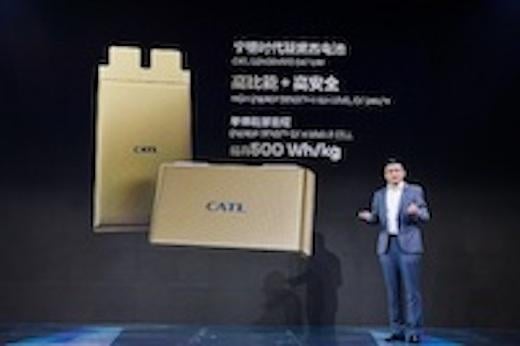
CATL plans to begin mass production of its 500 Wh/kg condensed battery for electric vehicles this year.
The largest manufacturer of lithium-ion batteries for electric vehicles, China’s CATL, has launched a high energy-density “condensed battery” technology and is targeting the electric passenger aircraft market. Mass production for the electric vehicle market is coming this year, the company says.
CATL announced at the Auto Shanghai show on April 19 it is launching a condensed-matter battery with an energy density of up to 500 Wh/kg at the cell level and a high level of safety. This compares with less than 300 Wh/kg for current lithium-ion batteries, which use a flammable liquid electrolyte.
The threshold for a feasible all-electric regional aircraft is about 500 Wh/kg, achieving about 25% of the current average range, battery researchers at Carnegie Mellon University reported in 2020.
Batteries with increased energy density are becoming available from startups, such as Ionblox’s silicon-anode lithium-ion cell at 330 Wh/kg and Amprius’ lithium-sulfur cell at 500 Wh/kg, but CATL brings the capability to produce its new battery technology in massive volumes for lower costs.
CATL says it is cooperating with partners in developing electric passenger aircraft and developing and testing its condensed-battery technology in accordance with aviation safety and quality requirements. The company displayed both pouch and prismatic cell-form factors at Auto Shanghai.
CATL has released little detail on its technology, which some experts think may be a form of semi-solid-state battery with a condensed-matter electrolyte that combines solid and liquid components. Experts says such batteries would have greater stability, higher conductivity and larger capacity.
The company says its condensed battery “leverages highly conductive biomimetic condensed-state electrolytes to construct a micron-level self-adaptive net structure that can adjust the interactive forces among the [lithium ion] chains.”
This improves the conductive performance of the cells and in turn the efficiency of lithium-ion transport while boosting stability of the microstructure, CATL says, adding the new battery also includes ultra-high energy-density cathode materials and new anode materials, separators and manufacturing processes.
CATL’s latest Qilin lithium-ion battery system for electric vehicles (EV) provides a pack-level energy density of up to 265 Wh/kg. The company introduced its first generation of sodium-ion battery in 2021 with an energy density of 160 Wh/kg and now has its first customer, a Chinese EV manufacturer. These batteries are lower cost and use abundant sodium rather than scarce materials such as lithium.





